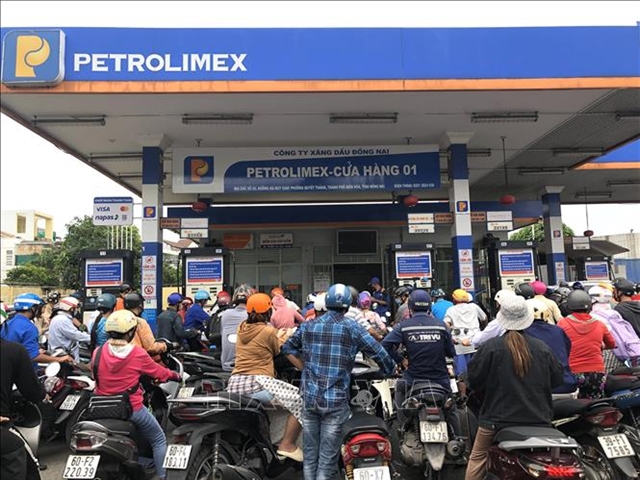Greater cooperation needed between fuel traders and retailers
According to Nguyễn Tiến Thỏa, former head of the price department under the Ministry of Finance, the root of the issue in the domestic fuel market was a failure to adhere to market principles, despite the central government's issuance of multiple decrees on the matter.
 |
|
This file photo shows a long line of people waiting at a fuel station in the southern province of Đồng Nai during a fuel shortage last year. VNA/VNS Photo |
HÀ NỘI — During an online conference focused on the fuel supply situation in the country, industry insiders and experts pointed to a major cause behind last year's nationwide fuel disruption: a lack of cooperation between fuel traders and retailers.
According to Nguyễn Tiến Thỏa, former head of the price department under the Ministry of Finance, the root of the issue in the domestic fuel market was a failure to adhere to market principles, despite the central Government's issuance of multiple decrees on the matter.
In principle, the central Government only intervenes during market disruption. Among many of the tools it can employ is setting ceiling prices. However, in practice, said ceiling prices have often been considered market prices.
In addition, there has been no effort to adjust prices during major public holidays, which often created large gaps between domestic and international fuel prices as the global market did not stop.
Retailers have long voiced their grievances over the imbalance of power between them and retailers, saying bonuses they received were entirely dependent on the whim of traders.
Meanwhile, traders blamed importers.
Văn Tấn Phụng, chairman of a fuel trading company in the southern province of Đồng Nai, said his firm suffered financial losses last year during the fuel disruption.
"As supply was disrupted, we were unable to restock. There was simply no money to go around," he said.
Economist Vũ Đình Ánh said it's high time the Government started building a market-oriented approach to ensure a stable fuel supply.
He said there was too much power on the side of retailers. Petrolimex and PV Oil alone accounted for up to 70 per cent of the entire market's supply, which gave them too much leverage over small retailers. Any market restructuring effort must include the rights and benefits of retailers for it to be long-term sustainable.
Trần Đình Thiên, former head of the Vietnam Institute of Economics, said going for quick fixes for the fuel market was not a sustainable solution.
Economists at the conference called for a ban on inter-trading among fuel traders, saying it often resulted in inflated supply, higher costs and further complicated fuel management. They also called for an exit mechanism, which has not been made available so far, to allow businesses to quit if their financial losses were too high.








